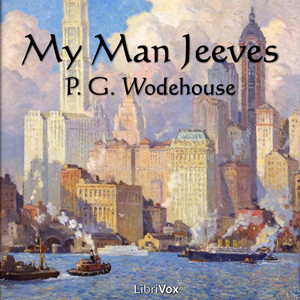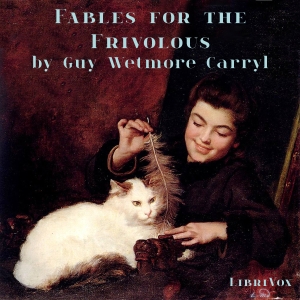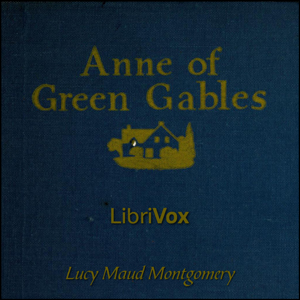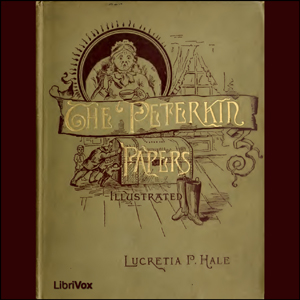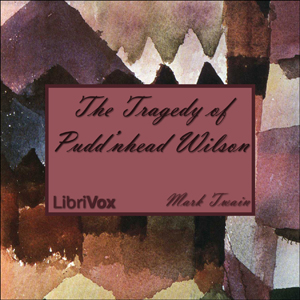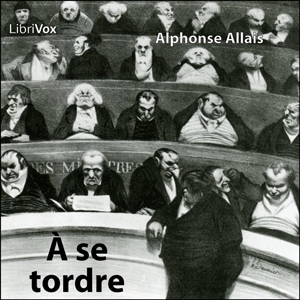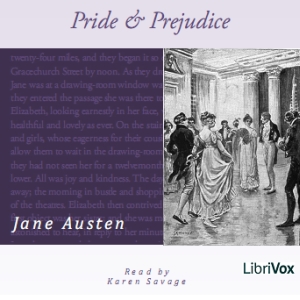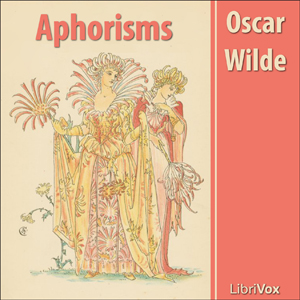Bertram Wooster is an English gentleman living in New York, who seems to get himself into all sorts of jams. It’s up to his manservant Jeeves to come up with the plan to save the day from unpleasant houseguests, stingy uncles, broken hearts, and hard-partying aunts. (Summary by Mark Nelson)
8 episodes
Two men visting the US from London meet a pair of charming women who return the visit the following year in London. Romantic intrigues, miscommunication and cultural faux pas abound in this short but delightful novel.
(Summary written by Kristen McQuillin)
6 episodes
Lucy Maud Montgomery’s classic children’s novel, Anne of Green Gables tells the story of a red headed orphan girl with a personality you can’t help but love. Despite her “tragical” past, Anne’s optimism and imagination have helped her to always see the best in things. Anne’s life changes considerably when she is accidentally adopted by the Cuthberts, a brother and sister who thought they were getting a boy to help out on the farm. The Cuthberts decide Anne will have to be sent back to the orphange but before they know it, she has begun to work her way into their hearts. (Summary by Annie Coleman)
38 episodes
Wilhelm Busch war einer der bedeutendsten humoristischen Zeichner und Dichter Deutschlands. Er gilt wegen seiner satirischen Bildergeschichten (u.a. Max und Moritz) in Versen als einer der Urväter des Comics. Die Bilder zu diesem Buch sind im Online Text enthalten. (Zusammenfassung von Wikipedia)
51 episodes
This personal anthology is my choice of speeches from Shakespeare that I enjoy reading (that I would like to have had by heart years ago!) and that seem to me to illustrate his unsurpassed use of language. He was a man who seemed to know everything about human nature and as Orson Welles said ‘he speaks to everyone and we all claim him’. I know that it has been said that ‘it is impossible to be a great Shakespearian actor without an idiosyncratic and extraordinary voice’ and this may be so, but that does not preclude ordinary mortals from reading, hearing and enjoying Shakespeare. (Summary by Martin Clifton)
20 episodes
Struwwelpeter (Slovenly Peter) is an illustrated collection of humorous children’s poems describing ludicrous and usually violent punishments for naughty behavior. Hoffmann, a Frankfurt physician, wanted to buy a picture book for his son for Christmas in 1844. Not impressed by what the stores had to offer, he instead bought a notebook and wrote his own stories and pictures. While Struwwelpeter is somewhat notorious for its perceived brutal treatment of the erring children, it has been influential on many later children’s books, most notably Charlie and the Chocolate Factory. (Summary by Catharine, Kara, and wikipedia.org)
1 episodes

Sunshine Sketches of a Little Town is a sequence of stories by Stephen Leacock, first published in 1912. It is generally considered to be one of the most enduring classics of Canadian humorous literature.
The fictional setting for these stories is Mariposa, a small town on the shore of Lake Wissanotti. Although drawn from his experiences in Orillia, Ontario, Leacock writes in the introduction:
“Mariposa is not a real town. On the contrary, it is about seventy or eighty of them. You may find them all the way from Lake Superior to the sea, with the same square streets and the same maple trees and the same churches and hotels.”
This work has remained popular for its universal appeal. Many of the characters, though modelled on townspeople of Orillia, are small town archetypes. Their shortcomings and weaknesses are presented in a humorous but affectionate way.
Often, the narrator greatly exaggerates the importance of the events in Mariposa compared to the rest of the world. For example, when there is a country-wide election, “the town of Mariposa, was, of course, the storm centre and focus point of the whole turmoil.” (Summary from Wikipedia)
13 episodes
Mike’s dream of studying and playing cricket at Cambridge are thwarted as his father runs into financial difficulties. Instead, Mike takes on the job of clerk at the “New Asiatic Bank.” Luckily, school friend Psmith, with his boundless optimism and original views, soon joins his department, and together they endeavour to make the best of their new life in London.
(Summary written by Gesine)
14 episodes

Robert Benchley, 1889-1945, was a writer, humorist and actor of note during the 1920s through the early 1940s. Born in Massachusetts, he spent his early literary career in New York City as an editor, critic and columnist for many of the major magazines of the day.
Along with George Kaufman, Dorothy Parker and Harpo Marx, he was an original "member" of the Algonquin Round Table. His popularity led him to a side career in radio and film, which took him to California in his later years. Writers as diverse as James Thurber, Woody Allen and Dave Barry have credited Benchley as an influence.
Love Conquers All, originally published in 1922 is the second collection (of fifteen) gathering together Benchley's humorous essays and reviews. Some references are dated, of course, but the surreal and mundane targets of Benchley's wit will be familiar to everyone. This volume collects 63 excellent gems from his early professional work, when Benchley's enthusiasm and style were approaching their peak.
(Summary by Ted Delorme)
13 episodes
Eve’s Diary is a humorous monologue about Eve’s experiences at the dawn of creation. She is fascinated by every aspect of the new world around her and… Adam! The following is an extract from Adam:
“She is all interest, eagerness, vivacity, the world is to her a charm, a wonder, a mystery, a joy; she can’t speak for delight when she finds a new flower, she must pet it and caress it and smell it and talk to it…. And she is color-mad: brown rocks, yellow sand, gray moss, green foliage, blue sky…none of them is of any practical value, so far as I can see, but because they have color and majesty, that is enough for her, and she loses her mind over them…. If there is anything on the planet that she is not interested in, it is not in my list.”
(Summary by Esther Lockwood)
3 episodes
One of the earliest works by the American parodist, Guy Wetmore Carryl, these fables are adapted from Jean de La Fontaine’s original writings. The fables are written in verse, and are light-hearted re-tellings of fables from two centuries before, each ending with a moral and a pun. Among the more celebrated of the fables are The Persevering Tortoise and the Pretentious Hare, The Arrogant Frog and the Superior Bull, and The Sycophantic Fox and the Gullible Raven. (Summary written by Chriss)
20 episodes
Saki (December 18, 1870 - November 14, 1916) was the pen name of the British author Hector Hugh Munro. His witty, biting and occasionally odd short stories satirised Edwardian culture. Saki is considered a master of the short story and has been compared to O. Henry and Dorothy Parker as well as Noel Coward and Oscar Wilde (who clearly influenced Saki.) His first collection of short stories, Reginald, was published by Methuen Press in 1904 though these stories first appeared in the 'Westminster Gazette'. The stories in this collection are a foil for allowing the jaded and insider/outsider figure of Reginald to comment on some ridiculous or provincial attitude prevelant in upperclass Edwardian society, although one can easily recoginize these same attitudes in our society today. Long popular and well known, Saki's brilliant humour is as enjoyable now as it was almost a century ago. (Summary by Jason Xanthopoulos).
15 episodes
Lucy Maud Montgomery’s classic children’s novel, Anne of Green Gables tells the story of a red headed orphan girl with a personality you can’t help but love. Despite her “tragical” past, Anne’s optimism and imagination have helped her to always see the best in things. Anne’s life changes considerably when she is accidentally adopted by the Cuthberts, a brother and sister who thought they were getting a boy to help out on the farm. The Cuthberts decide Anne will have to be sent back to the orphange but before they know it, she has begun to work her way into their hearts. (Summary by Annie Rothenberg)
38 episodes

The Pirates of Penzance; or, The Slave of Duty is a comic opera in two acts, with music by Arthur Sullivan and libretto by W. S. Gilbert. The story concerns Frederic, who, having completed his 21st year, is released from his apprenticeship to a band of tender-hearted pirates. He meets Mabel, the daughter of Major-General Stanley, and the two young people fall instantly in love. Frederic finds out, however, that he was born on 29 February, and so, technically, he only has a birthday each leap year. His apprenticeship indentures state that he remains apprenticed to the pirates until his 21st birthday, and so he must serve for another 63 years. Bound by his own sense of duty, Frederic's only solace is that Mabel agrees to wait for him faithfully. (Summary from Wikipedia)Cast
Narrator: Julie VW
Frederic: Karen Savage
Pirate King: StephenC
Samuel: Phil Chenevert
Ruth: Liberty Stump
Major-General Stanley: Kevin S. Mellis
Mabel: Catherine Eastman
Edith: BookAngel7
Kate: Ezwa
Isabel: JemmaBlythe
Sergeant of Police: John Fricker
Chorus:Alex Foster
BookAngel7
Catherine Eastman
Ezwa
Fred DeBerardinis
Helen Song
Henry Frigon
Jane Smith
JemmaBlythe
John Fricker
Karen Savage
Liberty Stump
Miriam Esther Goldman
StephenC
ToddHW
2 episodes
How do you tell apart a parrot from a carrot? A plover from a clover? A bay from a jay? Although there are several ways of differentiating, R. W. Wood’s use of pun and rhyme is one of the most entertaining! (Summary by Andrea L.)
1 episodes
Bertram Wooster's manservant, Jeeves, is renown for his ability to apply his keen intellect to solve all problems domestic, and Bertie's friends and relatives flock to him for his counsel. But Wooster, jealous of Jeeves's fame, decides to step in and take over as the fixer of his pal's engagement, his aunt's gambling debts and old school-mate's desire to propose marriage. How far will Bertie sink them all in the soup? Will Jeeves come to the rescue? "Right Ho, Jeeves" features of course Bertie and Jeeves as well as Gussie Fink-Nottle, Tuppie Glossop, Aunt Dahlia and Anatole the high-strung French chef in this P.G. Wodehouse farce of England's upper crust. (Summary by Mark Nelson)
23 episodes
Deep in the heart of every parent is the wish, the desire, to have other adults tell us, in an unsolicited way, just how very polite one’s child is! This perhaps was even more the case in 1903, when Gelett Burgess produced his second book on the Goops. With entertaining cartoons - cariacatures of misbehaving children - he described many different breaches of tact and good manners.
Burgess wrote several books of poetry on the Goops, each poem describing some significant way in which an unthoughtful or unkind child could offend polite society and often offering the hope that the listener would never behave that way. Ahem! Well, perhaps very few people have succeeded in not acting Goop-like at some point in their lives, but read along with Burgess as he attempts to define, in a humorous fashion, exactly what the differences between “Good” and “Goop” are!(Summary by Mark F. Smith)
1 episodes
Get the true story of Adam and Eve, straight from the source. This humorous text is a day-to-day account of Adam’s life from happiness in the “GARDEN-OF-EDEN” to their fall from grace and the events thereafter. Learn how Eve caught the infant Cain, and Adam takes some time to learn exactly what it is.
5 episodes
Three Men in a Boat (To Say Nothing of the Dog), published in 1889, is a humorous account by Jerome K. Jerome of a boating holiday on the Thames between Kingston and Oxford.The book was intended initially to be a serious travel guide, with accounts of local history of places along the route, but the humorous elements eventually took over, to the point where the serious and somewhat sentimental passages now seem like an unnecessary distraction to the essentially comic novel. One of the most praised things about Three Men in a Boat is how undated it appears to modern readers. The jokes seem fresh and witty even today.The three men were based on Jerome himself and two real-life friends, George, and Harris. The dog, Montmorency, however, was entirely fictional, but, as Jerome had remarked, "had much of me in it." (Summary from Wikipedia)
19 episodes
The Wheels of Chance - A Bicycling Idyll follows the adventures of a Drapers Assistant who, having brought an ancient bicycle, sets off on a 2 week tour of the countryside. And his world will never be the same again.(Summary by annise)
15 episodes

Pygmalion (1913) is a play by George Bernard Shaw based on the Greek myth of the same name. It tells the story of Henry Higgins, a professor of phonetics (based on phonetician Henry Sweet), who makes a bet with his friend Colonel Pickering that he can successfully pass off a Cockney flower girl, Eliza Doolittle, as a refined society lady by teaching her how to speak with an upper class accent and training her in etiquette. In the process, Higgins and Doolittle grow close, but she ultimately rejects his domineering ways and declares she will marry Freddy Eynsford-Hill – a young, poor, gentleman. - The play was later the basis for the successful movie adaptation "My Fair Lady" with Audrey Hepburn as Eliza and Rex Harrison as Prof. Higgins. (Summary by Wikipedia/Gesine)
Cast list:
Narrator – Kirsten Ferreri & Mary Anderson
The Daughter / Miss Clara Eynsford Hill – Susie G.
The Mother / Mrs Eynsford Hill – Gesine
A Bystander – Peter Yearsley
Freddy Eynsford Hill – ianish
The Flower Girl / Liza Doolittle – Kristin Hughes
A Gentleman / Captain Pickering – Martin Clifton
The Note Taker / Professor Henry Higgins – Alex Foster
A Sarcastic Bystander – Peter Yearsley
Mrs Pearce – Christiane Levesque
Alfred Doolittle – David Barnes
Mrs Higgins – Larysa Jaworski
Parlour-Maid – Linda Wilcox
Director/File editor – David Lawrence
7 episodes
Idle Thoughts of an Idle Fellow, published in 1886, is a collection of humorous essays by Jerome K. Jerome. It was the author’s second published book and helped establish him as a leading English humorist. The book consists of 14 independent articles arranged by themes. (Summary from Wikipedia)
15 episodes
The idea was to write a whole novel in the month of November, based on the guidelines of the National Novel Writing Month. The twist is that there are up to 30 people writing together, instead of one toiling alone. Each writer signed up to do one section of 1,700+ words, in English. Plot and particulars were agreed before the start. Each writer also recorded his/her own chapter, which can be downloaded here. The resulting novel is in the public domain. (Summary by Gesine)
32 episodes
This is the first of three novels which Edith Somerville and her cousin Violet Martin wrote about the English Major Sinclair Yates who leaves the army to take up a position of Resident Magistrate in the West of Ireland in about 1895. The tales tell in a humorous way of his struggles with a new job, new culture, and with his landlord and neighbour Mr. ‘Flurry’ Knox whose prime, if not only, interest is in hunting, which forms the background to all the stories. Miss Somerville was herself the first woman anywhere to become an M.F.H. (Summary by A.J.M.)
12 episodes
Jeremy Garnet, a second-rate novelist, gets talked into joining his old pal Stanley Featheringstonehaugh Ukridge in an insane plan to start a chicken ranch. Garnet should bail out on his crazy friend, but he falls in love with one of Ukridge's neighbors, Phyllis. Soon he is up to his neck in sick chickens, bad debts, a hostile future father-in-law, a sinister plot, and dirty golf. It all gets a bit thick, what? (Summary by Mark Nelson)
23 episodes
The Peterkins were a lovable but comically inept family that possess ingenuity, logic, resourcefulness, and energy--but not common sense. The general formula is that the family tries to solve some problem in an appealingly roundabout way, fails, and is eventually rescued by "the wise old lady from Philadelphia" who always cuts the Gordian knot with some effective but prosaic solution. The charm of the story is not in the plot, but in the telling, with the building up of layers of complication, and the affectionate fun poked at the not-quite-cartoonish characters. The "wise old lady's" solution is usually obvious to the reader, or even the young listener, from the start. (From Wikipedia)
12 episodes
The action takes place in London, with excursions to Devon, Yorkshire, and Portsmouth, as we follow the adventures of the eponymous hero. Nicholas is forced to unwelcome employment to help secure support for his widowed mother and his sister from their mercenary relative Ralph, on whose mercy they have been thrown. After many adventures Nicholas finally triumphs over his Uncle, although his success is also tinged with sadness. (Summary by Chris Garbett)
66 episodes
The second of Crompton's series of 39 books about William Brown, our cheeky 11 year-old protagonist. A hero to some, a dastardly villain to others, this book is structured round a year in his life. Starting with William waking up on Christmas morning and ending with him going to sleep the following Christmas Eve, there are the usual round of misadventures, misunderstanding and general mayhem in between. When a boy like William wakes up under a motto that says "A Busy Day Is A Happy Day" alongside a copy of "Things A Boy Can Do", the chaos is just around the corner. Includes the very first William short story - "Rice Mould". Often dismissed as childrens literature, the first few books of William stories were probably aimed more at an adult audience. They resonate with a distinctly English humour, but there are obvious echoes from 'Tom Sawyer' and 'Huckleberry Finn'.
14 episodes
From the cave man to Santa Claus; spies, know-it-alls, and journalists: all are fair game for Leacock’s special brand of humor. He touches on the changes time has brought about in the city, education, and work habits. Among the other topics in this work are nature, fishing, gardening, success, and spirits--both of the departed and of the variety Prohibition prohibited.Each chapter of this book is a standalone story and if you love a good laugh, these stories are for you. In me, Leacock’s wit produced the full range of laughter: smiles, chuckles, guffaws, and some uncontrollable giggles. Also, occasionally, I found myself shedding a tear or two. (Review by Debra Lynn)
18 episodes
Sir Pelham Grenville Wodehouse was an English comic writer who enjoyed enormous popular success for more than seventy years. Best known today for the Jeeves and Blanding Castle novels and short stories, Wodehouse was also a talented playwright and lyricist who was part author and writer of fifteen plays and of 250 lyrics for some thirty musical comedies. (excerpts from Wikipedia)
19 episodes
Manasseh da Costa, protagonist of this hilarious novel, is a schnorrer (beggar) who lives on the charitable contributions of the Jews of late 18th-century London. Manasseh is far from being a humble panhandler for, as every schnorrer knows, supporting the poor is a commandment from God (a mitzvah) not just a favour. And as the descendant of Portuguese Jews who had lived in England for many generations, Manasseh is the social superior of those newly arrived from Eastern Europe (Tedesco)—even his wealthy ‘patron’ Joseph Grobstock. The book concludes as the ever-audacious Manasseh strikes a blow for tolerance and understanding—while helping himself along the way. (Summary by Adrian Praetzellis)
Alt-BC: Lucy Burgoyne
6 episodes
In one of his later novels, the master storyteller spins a tale of two children switched at infancy. A slave takes on the identity of master and heir while the rightful heir is condemned to live the life of a slave. Twain uses this vehicle to explore themes of nature vs. nurture, racial bigotry and moral relativism. The case of mistaken identity is a theme that Twain explored also in THE PRINCE AND THE PAUPER; in THE TRAGEDY OF PUDD'NHEAD WILSON he turns the theme into a well-crafted detective story. It is unfortunate that this is one of Twain's lesser known works as it is one of his most enjoyable reads.
23 episodes
Edgar Wilson “Bill” Nye (1850 – 1896) was a distinguished American journalist, who later became widely known as a humorist. Jim “jimmowatt” Mowatt is a distinguished LibriVox volunteer, widely known for his continued devotion both to regularly producing the LibriVox Community Podcast and to regularly creating more and more history audiobooks for the public domain, renowned for his humor and his historically kind demeanor, lately recognized as holding a diploma as well as a mic. In light of that new holding, in celebration of graduation, this bit of history has been recorded with Jim in mind, owing to all that we owe him, glowing with glee that we know him, it’s what we’ve done just to show him that he’s a jolly good fellow. (Summary by Anita and Alan)
19 episodes
Miss Civilization, a one act comedy, tells the story of a young woman who matches wits with three burglars attempting to rob her house. This recording was made in Chicago at the LibriVox World Gathering in May 2007.
Cast:
Kristin Hughes
Betsie Bush
Julian Jamison
1 episodes
When the absent-minded Earl of Emsworth wanders off with the pride of his scarab collection, American millionaire J. Preston Peters is willing to pay $5000 to the person who can get it back for him. Discretion is necessary since Peters’ daughter is engaged to Emsworth’s son. Joan Valentine and Ashe Marson both decide to go after the reward—she as Aline Peter’s ladies maid, and he as Mr. Peter’s valet—and they all end up at Blandings Castle. But is it possible for anyone to steal back the scarab with The Efficient Baxter ever vigilant? This is, IMHO, one of Wodehouse’s funniest novels. –Debra Lynn
15 episodes

Antonio Ghislanzoni, nato a Barco di Maggianico (Lecco) il 25 novembre 1824, è meglio noto come autore di numerosissimi libretti per opere liriche tra cui "Aida" e "La forza del destino" di Giuseppe Verdi. Personalità eclettica: baritono egli stesso fino al 1856, nonché ex seminarista cacciato per cattiva condotta, stimolato dalle idee di Mazzini, nel 1848 dirige a Milano diversi giornali repubblicani; a causa delle sue idee fu anche arrestato dai francesi e brevemente detenuto in Corsica. Muore a Caprino Bergamasco il 16 luglio 1893."La contessa di Karolystria" è definito dallo stesso autore "il più balzano, il più strampalato de' miei racconti", e in effetti altro non è che una storia divertente piena di colpi di scena senza pretesa di avere "messaggi" da trasmettere. La trama è presto detta: il visconte d'Aguilar -personaggio in cui potremmo scorgere lo stesso autore- si lascia coinvolgere nel turbine di avventure in cui viene trascinato per soccorrere la contessa di Karolystria e brillantemente, tra mille peripezie, riesce cavarla dai guai e ad aprirle un nuovo futuro. -- Riccardo.
10 episodes
This novel introduces the characters Mike Jackson and Psmith, who are featured in several of Wodehouse’s later works. It shows how the two characters first met each other as teenagers at boarding school. As Psmith doesn’t appear until about halfway through this book, it was later released as two separate books, Mike at Wrykyn and Mike and Psmith. There’s lots of cricket, but you don’t need to understand the game to enjoy the antics of these public school boys as they "rag" each other and the authorities.-Summary by Debra Lynn
21 episodes
Psmith takes over editing a paper while the usual editor is away on vacation. He takes on a local slum lord, and divers alarums ensue. (description by Psuke Bariah)
29 episodes
"Captain Stormfield's Visit to Heaven" is a short-story written by American writer Mark Twain and published in 1909. The story follows Captain Stormfield on his extremely long cosmic journey to heaven, his accidental misplacement, his short-lived interest in singing and playing the harp, and the obsession of souls with the "celebrities" of heaven, like Adam and Moses, whom, according to Twain, become as distant to most people in heaven as living celebrities are on Earth. Twain uses this story to show his view that the common conception of heaven is ludicrous and points out the incongruities of such beliefs. (from Wikipedia)
2 episodes
Irwin Cobb's humorous Europe Revised is a travelogue and comedy almost in the style of Mark Twain. The dedication says it best, "To My Small Daughter
Who bade me shed a tear at the tomb of Napoleon, which I was very glad to do, because when I got there my feet certainly were hurting me."
51 episodes
Alphonse Allais est un journaliste, écrivain et humoriste français célèbre à la Belle Époque, connu pour sa plume acerbe et son humour absurde. (adapté de Wikipedia par Ezwa)
Alphonse Allais was a French writer and humorist.
He is the author of many collections of whimsical writings. (from Wikipedia)
44 episodes
Love and Freindship [sic] is a juvenile story by Jane Austen, dated 1790, when Austen was 14 years old. Love and Freindship (the misspelling is one of many in the story) is clearly a parody of romantic novels Austen read as a child. This is clear even from the subtitle, "Deceived in Freindship and Betrayed in Love," which neatly undercuts the title.Written in epistolary form, it resembles a fairy tale as much as anything else, featuring wild coincidences and turns of fortune, but Austen is determined to lampoon the conventions of romantic stories, right down to the utter failure of romantic fainting spells, which always turn out dreadfully for the female characters.In this story one can see the development of Austen's sharp wit and disdain for romantic sensibility, so characteristic of her later novels.Summary revised from Wikipedia by Cori Samuel. Music from Schubert's Fantasy in C Major, at musopen.org.
3 episodes
In this hilarious novel, Harry Burton, a bachelor white-goods salesman, goes to take care of his sister Helen's two little boys for ten days while she and her husband are out of town. Helen says, "The children won't give you the slightest trouble; they're the best children in the world!" but, as you can imagine, Toddie and Budge are always up to something, and all sorts of comic mischief ensues. It just so happens that there's a lovely young lady in the neighborhood whom Harry admires very much, but she always seems to be passing by when he's deep in some terrible mess of the boys' making... (Summary by Kara)
12 episodes
Qui n'a jamais entendu parler de Tartarin de Tarascon, le grand Tartarin, héros de Tarascon, chef des chasseurs de casquettes ? Alphonse Daudet nous le présente, nous dépeint son « chez lui », ses habitudes, sa vie à Tarascon, qu'il va être amené à quitter pour une chasse au lion ... Il nous invite à le suivre en Algérie et à découvrir ses aventures burlesques. (Introduction de Ezwa) "Tartarin de Tarascon" tells the burlesque adventures of Tartarin, a local hero of Tarascon, a small town in southern France, whose invented adventures and reputation as a swashbuckler finally force him to travel to a very prosaic Algiers in search of lions. Instead of finding a romantic, mysterious Oriental fantasy land, he finds a sordid world suspended between Europe and the Middle East. And worst of all, there are no lions left. (Summary from Wikipedia)
An English version is available / Une version anglaise est disponible : Tartarin of Tarascon.
34 episodes
The Bab Ballads are a collection of light verse by W. S. Gilbert, illustrated with his own comic drawings. Gilbert wrote the Ballads before he became famous for his comic opera librettos with Arthur Sullivan. In writing the Bab Ballads, Gilbert developed his unique "topsy-turvy" style, where the humour was derived by setting up a ridiculous premise and working out its logical consequences, however absurd. The Ballads also reveal Gilbert's cynical and satirical approach to humour. They became famous on their own, as well as being a source for plot elements, characters and songs that Gilbert would recycle in the Gilbert and Sullivan operas. The Bab Ballads take their name from Gilbert's childhood nickname, and he later began to sign his illustrations "Bab". (summary from wikipedia)
e-text with illustrations
44 episodes
This is the third collection of short stories by Saki, following on from “Reginald” and “Reginald in Russia”. Although some of the stories have characters that do not appear elsewhere in the collection, many of them are loosely centred round the young Clovis Sangrail (effectively a reincarnation of Reginald). (Summary by Graham Redman).
29 episodes
Pride and Prejudice is the most famous of Jane Austen’s novels, and its opening is one of the most famous lines in English literature - “It is a truth universally acknowledged, that a single man in possession of a good fortune, must be in want of a wife.” Its manuscript was first written between 1796 and 1797, and was initially called First Impressions, but was never published under that title. Following revisions it was published on 28 January 1813 by the same Mr. Egerton of the Military Library, Whitehall, who had brought out Sense and Sensibility. Like both its predecessor and Northanger Abbey, it was written at Steventon Rectory. (Summary from Wikipedia)
61 episodes
The Young Visiters is a comic romance novella that parodies upper class society of late Victorian England. Social climber Alfred Salteena introduces his young lady friend Ethel to a genuine gentleman named Bernard and, to his irritation, they hit it off. But Bernard helps Alfred in his plan to become a gentleman, which, Alfred hopes, will help him win back Ethel.
(Summary by Derek Jensen)
3 episodes
In 1894, Oscar Wilde (1854 - 1900) published two collections of aphorisms: A Few Maxims For The Instruction Of The Over-Educated, in the Saturday Review newspaper, and Phrases and Philosophies for the Use of the Young, in the Oxford student magazine The Chameleon. By turns witty, intellectual, counter-intuitive and obtruse, the collections came to be seen by many as emblematic of Wilde's style, and countless collections of Wildean aphorisms have since been published. (Summary by Carl Manchester)
2 episodes
56 flavors of Pi proudly produced by LibriVox volunteers to celebrate Pi Day, 2008. (3/14) Don't worry, you don't have to listen to an infinite string of numbers: each reader presents just the first 50 digits in styles of their own choosing.In light of the spirit of this occasion (and the might of our spirited community), this LibriVox offering makes a gentle exception to the policy of faithfully presenting just the text. This is the real Pi, but served up with a side of sillies -- it's Pi a la volunteer. (Summary by Cori Samuel and Anita Roy Dobbs)
56 episodes
